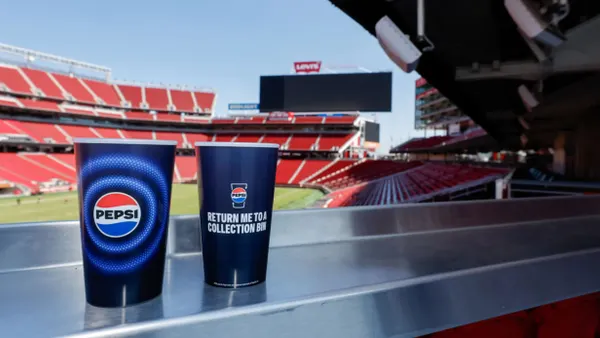Dive Brief:
- The Waste Management Phoenix Open, which opened this week and kicks off Feb. 1 with the first round of a golf tournament, bills itself as the largest "zero waste" event in the world. The event has received third-party verification of its waste diversion from UL since 2013, according to a press release. Material is either donated or reused, used as feedstock for waste-to-energy, composted or recycled.
- Waste Management and The Thunderbirds (the tournament host) work with vendors to require them to use compostable, recyclable or reusable products, Michele Grossman, managing principal for Waste Management Sustainability Services told Waste Dive in an email. "The requirements outline specific compliant and non-compliant options, and includes a link to a short vendor survey that confirms that vendors understand the details of the requirements and provides Waste Management with operational information."
- Food service material is made to be compostable, and bins are marked with words and symbols to indicate what material goes where. Once collected, material goes to the Deer Valley Transfer Station where WM does "an exceptionally thorough sort" before sending material to the WM Northwest Regional MRF or a local composting facility.
Dive Insight:
While some would say sending tons of material to WTE isn't the proper way to think about "zero waste," pulling off such a large event and sending no material to landfill is still quite a feat. According to Waste Management's data, the tournament has diverted more than 3,297 tons of material from landfill, sending just 124 tons of waste to be landfilled between 2010-2012.
The way tournament organizers work with vendors and clearly label disposal options serve as a strong reminder of how crucial it is to engage with consumers and customers when pursuing "zero waste" goals. Clearly-labeled bins can help in public settings or at events, and clear customer messaging and education can help with increasing recycling rates.
For Waste Management, that means on-site education during the Phoenix Open. The company has converted old dumpsters into "zero waste stations" to engage and educate attendees. The stations include information explaining what material goes into which bins or compactors at the tournament, but also education about how they can reduce their personal waste after the tournament. Grossman said the company "works hard to help fans understand the value of making the right disposal decisions."
The ability through contract negotiation with vendors to ensure compliance likely helps, too. Grossman said that before the tournament, The Thunderbirds organize an in-person meeting, Waste Management calls the vendors, and Waste Management checks in with vendors on-site. She added there are no exceptions for non-compliant material.
This is the latest example of service providers showing that high diversion rates are possible at large-scale events when careful planning and education is involved. Recent events with a similar approach include the Philadelphia Marathon, Greenbuild International Conference and Expo, NHL 2018 Winter Classic and the upcoming Super Bowl at Minneapolis' U.S. Bank Stadium.









